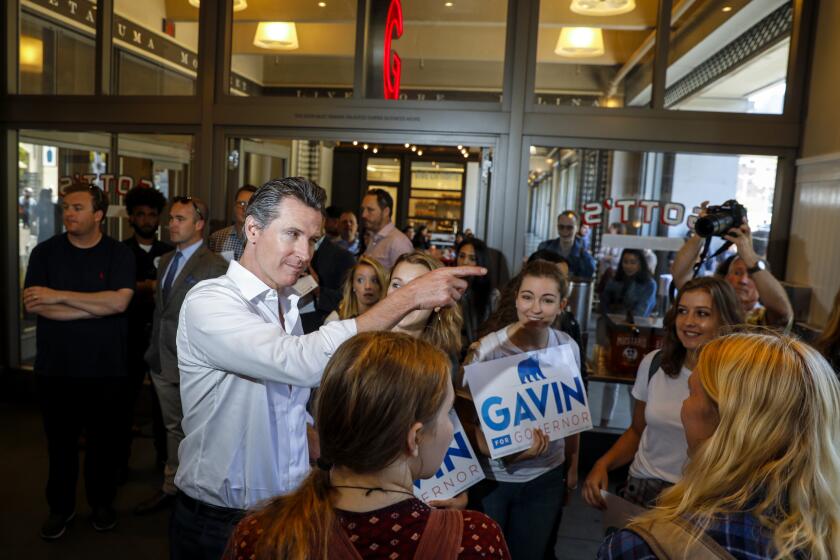Column: Biden scored a win on COVID relief, but the battle for hearts and minds is far from over

- Share via
President Biden is riding high thanks to his success in pushing through the massive $1.9-trillion COVID relief bill he signed last week. Polls have found that the bill was supported by as many as 70% of Americans, and the president’s approval rating has hit 55%, a level last attained by Barack Obama in 2009, the first year of his presidency.
But the moment of triumph is likely to be fleeting. Even sending $1,400 checks to most Americans can’t guarantee that Biden will be able to enact the rest of his ambitious agenda or hold on to Democrats’ majorities in Congress in next year’s midterm election.
Problem No. 1 is the economy, which may not bounce back as quickly as Democrats hope. Biden is well aware of that danger; he was vice president in 2009, when Obama passed an economic stimulus bill, but recovery was nevertheless slow and voters gave him little credit.
Biden’s relief bill is more than twice as big as Obama’s, which will help, and if vaccinations quickly quell the COVID-19 pandemic, the economy should recover more rapidly than it did after the financial crash of the Obama years.
But for Democrats to reap a political benefit, it’s not enough for the economy to bounce back: Voters have to also credit them for the recovery.
That’s why Biden plans to hit the road this week to begin a long victory lap. And that’s why his relief package includes benefits that were designed to be memorable, with checks and bank transfers sent directly to voters, plus monthly subsidies for families with children.
Gavin Newsom has faced a backlash against COVID closures and their effects on the economy, fueling a recall effort led by Republican activists.
“The most important thing is to make sure the government part of this is working and get the checks out there,” Democratic strategist Stan Greenberg told me. Even then, he warned, the midterm election is 20 long months away. “There’s always a danger that voters will ask: ‘What have you done for me lately?’”
That’s where the rest of Biden’s agenda comes in. The president still has a long list of legislation he wants to pass, including bills on infrastructure spending, improvements to healthcare, immigration reform, gun control and climate change programs.
If his agenda stalls — as is likely given united Republican opposition — he will look ineffective. And even if he gets what he wants from Congress, he’ll please some Americans, but alienate others.
Republicans are already attacking Biden on issues where they believe he’s vulnerable: spending levels, school reopening and immigration.
House Minority Leader Kevin McCarthy (R-Bakersfield) denounced the COVID relief bill last week as a waste of taxpayer money. “It’s going to cost every family of four $22,000,” he said on Fox News.
Republicans have also accused Biden of dragging his feet on his promise to reopen most schools in his first 100 days in office in the face of opposition from teachers unions.
Biden faces what may be his biggest challenge with immigration. It will be hard to get Congress to focus on reform — and on creating a path to citizenship for undocumented immigrants now in the country — while thousands of unaccompanied minors are flooding across the U.S.-Mexico border, as has been happening in recent weeks.
Biden also faces something President Trump rarely had to deal with: criticism from within his party. On immigration, progressives like Rep. Alexandria Ocasio-Cortez (D-N.Y.) have complained that large numbers of children are being detained in unacceptable conditions.
And the party’s divisions are likely to grow more pronounced as Biden begins to push his broader legislative agenda, with progressives pushing for ambitious legislation, while vulnerable moderates in purple districts urge a more gradual approach.
As he navigates the political shoals, Biden will be acutely aware of a looming threat: The president’s party almost always loses seats in Congress at the two-year mark.
Only once in the last 87 years has a president escaped that rule: 2002, when President George W. Bush appealed for national unity after the terrorist attacks of Sept. 11, 2001.
Democrats’ majorities today are razor-thin. The Senate is divided 50-50, which means the Democrats enjoy a majority only because Vice President Kamala Harris is there to break ties. In the House, Democrats hold a slim nine-seat advantage, 220 to 211.
Strategists in both parties say the Democrats are more likely than not to lose their majority in the House. Republicans are bragging that their success in redrawing favorable congressional boundaries through redistricting has already moved them partway to winning back a majority of seats. That would deprive Biden of his ability to turn almost any of his priorities into law.
So yes, the COVID bill was a nice big victory — but the president and his party shouldn’t waste time savoring it.
More to Read
Get the L.A. Times Politics newsletter
Deeply reported insights into legislation, politics and policy from Sacramento, Washington and beyond. In your inbox three times per week.
You may occasionally receive promotional content from the Los Angeles Times.












